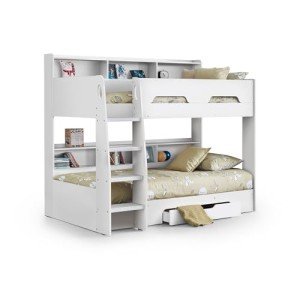
When it pertains to styling a kid's room, moms and dads often deal with the dual obstacle of taking full advantage of space while ensuring comfort and performance. Bunk beds have actually emerged as a popular option that addresses these requirements, using not just sleeping plans however also contributing to a room's visual. In this comprehensive guide, we will delve into different aspects of children's Bunk Beds Children's beds, concentrating on their advantages, security features, designs, and factors to consider for parents considering this purchase.
Bunk beds offer numerous advantages for kids and their moms and dads. Here are some crucial benefits:
Space-Efficiency: Bunk beds are an exceptional option for smaller sized spaces. By stacking one bed on top of another, more floor space is offered for play, storage, or research study locations.
Cost-Effective: When kids share spaces, bunk beds can lower the requirement for buying 2 different beds, thus saving cash.
Promotes Social Interaction: Bunk beds can assist brother or sisters or good friends bond by sharing a space, developing opportunities for social advancement.
Fun Factor: The principle of sleeping "up high" adds a playful element to bedtime, making the shift to sleeping alone much easier for some children.
Versatile Design: Bunk beds are available in numerous styles, colors, and develops to match any space style, permitting modification that shows the kid's personality.
Safety is critical when it pertains to children's furniture, specifically when it comes to bunk beds. Here are some crucial safety functions to examine:
| Safety Feature | Description |
|---|---|
| Sturdy Construction | Frames made from strong wood or metal are preferred. |
| Guardrails | Need to be at least 5 inches high and extend along both sides of the upper bunk. |
| Ladder Design | Ensure ladders are safely attached and have non-slip actions. |
| Mattress Size & & Fit | Should fit snugly within the frame to avoid gaps. |
| Weight Limit | Constantly follow the manufacturer's weight limit suggestions. |
Bunk beds are available in numerous styles, dealing with numerous needs, preferences, and space sizes. Here are some common types:
Standard Bunk Bed: The the majority of basic type, with one bed on top of another.
Loft Bed: Features a high upper bed with space below for a desk or play location.
Futon Bunk Bed: Combines a top bunk with a futon on the bottom, supplying flexibility for seating and sleeping.
L-Shaped Bunk Bed: This style has the leading bunk set at a perpendicular angle to the bottom, creating a small corner location.
Triple Bunk Bed: Accommodates three children utilizing stacked beds, perfect for big families or sleepovers.
When it pertains to choosing a design for children's bunk beds, the options are practically unlimited. Here are some popular designs:
Traditional Style: Often made from wood, these bunk beds include ornate information and are ideal for traditional or rustic-themed rooms.
Modern Style: Characterized by tidy lines and minimalist styles, contemporary bunk beds can be made of metal or wood.
Themed Bunk Beds: Some brand names offer bunk beds shaped like castles, vehicles, or play houses, making bedtime less of a task.
Convertible Bunk Beds: These can be separated into 2 specific beds, offering flexibility as kids grow.
Colorful Options: Bunk beds in vibrant colors can add a sense of pleasure and playfulness to any room.
Maintaining a bunk bed is essential for durability and safety. Here are some pointers:
Regular Inspections: Check for loose screws or bolts every few months and tighten them as needed.
Cleaning: Wipe down frames regularly to avoid dust accumulation; consider using a vacuum for hard-to-reach areas.
Mattress Care: Rotate mattresses frequently and utilize protective covers to prolong their life.
See for Wear and Tear: Look for any signs of damage in the wood or metal and think about replacing parts if required.
Teach Kids Safety Rules: Encourage kids to utilize ladders effectively and ensure they comprehend the security functions of their bed.
A1: Typically, children aged 6 and older are recommended for upper bunk sleeping, as they have the needed motor abilities to climb up safely.
A2: Most bunk beds are offered as frames only, so you will require to buy bed mattress separately. Ensure that the bed mattress fits the frame comfortably.
A3: Many designs permit conversion into two individual beds, supplying flexibility for future needs.
A4: Comply with security standards and ensure guardrails, a strong frame, and a secured ladder remain in place.
A5: Yes, always examine the producer's specifications regarding weight limitations to make sure safety.

Bunk beds for children can serve numerous functions while ensuring safety and design. With varied styles and designs available on the market, moms and dads can find an unit that not only takes full advantage of bed room space but also reflects their child's unique tastes. As with any furniture, comprehending security features, maintenance, and how they suit a child's lifestyle will ensure that these beds remain a useful furniture service for years to come.
Through careful consideration and adherence to security standards, bunk beds can offer a lasting, enjoyable, and functional sleeping service that children love.
No Data Found!

